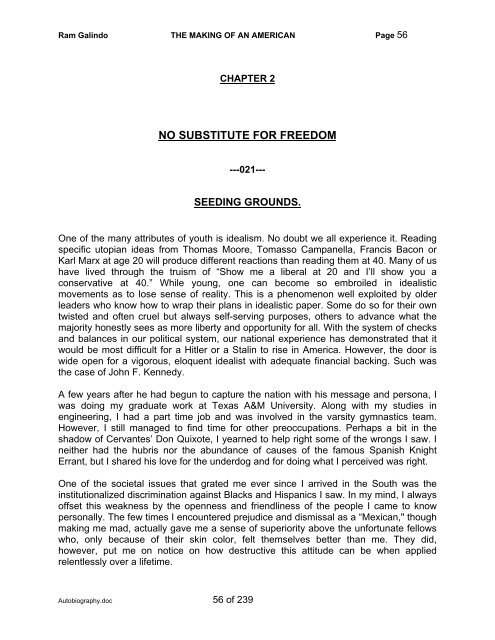Autobiography - The Galindo Group
Autobiography - The Galindo Group
Autobiography - The Galindo Group
You also want an ePaper? Increase the reach of your titles
YUMPU automatically turns print PDFs into web optimized ePapers that Google loves.
Ram <strong>Galindo</strong> THE MAKING OF AN AMERICAN Page 56<br />
CHAPTER 2<br />
NO SUBSTITUTE FOR FREEDOM<br />
---021---<br />
SEEDING GROUNDS.<br />
One of the many attributes of youth is idealism. No doubt we all experience it. Reading<br />
specific utopian ideas from Thomas Moore, Tomasso Campanella, Francis Bacon or<br />
Karl Marx at age 20 will produce different reactions than reading them at 40. Many of us<br />
have lived through the truism of “Show me a liberal at 20 and I’ll show you a<br />
conservative at 40.” While young, one can become so embroiled in idealistic<br />
movements as to lose sense of reality. This is a phenomenon well exploited by older<br />
leaders who know how to wrap their plans in idealistic paper. Some do so for their own<br />
twisted and often cruel but always self-serving purposes, others to advance what the<br />
majority honestly sees as more liberty and opportunity for all. With the system of checks<br />
and balances in our political system, our national experience has demonstrated that it<br />
would be most difficult for a Hitler or a Stalin to rise in America. However, the door is<br />
wide open for a vigorous, eloquent idealist with adequate financial backing. Such was<br />
the case of John F. Kennedy.<br />
A few years after he had begun to capture the nation with his message and persona, I<br />
was doing my graduate work at Texas A&M University. Along with my studies in<br />
engineering, I had a part time job and was involved in the varsity gymnastics team.<br />
However, I still managed to find time for other preoccupations. Perhaps a bit in the<br />
shadow of Cervantes’ Don Quixote, I yearned to help right some of the wrongs I saw. I<br />
neither had the hubris nor the abundance of causes of the famous Spanish Knight<br />
Errant, but I shared his love for the underdog and for doing what I perceived was right.<br />
One of the societal issues that grated me ever since I arrived in the South was the<br />
institutionalized discrimination against Blacks and Hispanics I saw. In my mind, I always<br />
offset this weakness by the openness and friendliness of the people I came to know<br />
personally. <strong>The</strong> few times I encountered prejudice and dismissal as a “Mexican," though<br />
making me mad, actually gave me a sense of superiority above the unfortunate fellows<br />
who, only because of their skin color, felt themselves better than me. <strong>The</strong>y did,<br />
however, put me on notice on how destructive this attitude can be when applied<br />
relentlessly over a lifetime.<br />
<strong>Autobiography</strong>.doc 56 of 239


